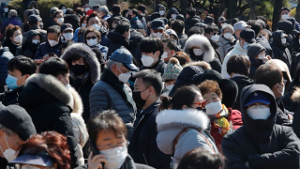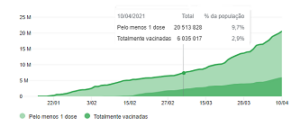
Posts Tagged ‘pandemia’
O que faremos com a nossa vida?
A clareza era que já havia um movimento no qual “tanto as causas antrópicas, humanas, e a desregulagem climática, quanto aos ataques a biodiversidade” (Morin, Viveret, 2013, p. 35) algum descompasso civilizatório já era notado, e o que eles chamam de excesso: “já está presente, tanto na crise ecológica, quanto na face social, financeira ou geopolítica da crise”, e é ela que gera a muito tempo um mal estar, já dizia Freud um “mal estar na civilização”.
humanas, e a desregulagem climática, quanto aos ataques a biodiversidade” (Morin, Viveret, 2013, p. 35) algum descompasso civilizatório já era notado, e o que eles chamam de excesso: “já está presente, tanto na crise ecológica, quanto na face social, financeira ou geopolítica da crise”, e é ela que gera a muito tempo um mal estar, já dizia Freud um “mal estar na civilização”.
Contam os autores, fazendo uma ironia que o Wall Street Journal em breve momento de lucidez escreveu: “Wall Street conhece apenas dois sentimentos, a euforia e o pânico”. (p. 37), dito de outra forma por aqueles que não aplicam em jogos de bolsas de valores, “o caráter sistêmico da crise que atravessamos é, portanto, formado por essa dupla excesso/mal- estar” (p. 40), e a pandemia o que fez foi colocar esta dupla numa espiral descendente.
Não é uma pergunta feita depois da pandemia, mas antes no livro que estamos analisando “Como viver em tempo de crise?” de Edgar Morin e Patrick Viveret, ao reler vejo a clareza que tinham do futuro, embora a pandemia não tenha sido imaginada por ninguém, mesmo aqueles que previam uma guerra biológica ou uma humanidade paralisada, refiro me aqui ao Ensaio sobre a Cegueira de Saramago, e o “O Evento cobra” de Richard Preston.
Este ciclo, mais ainda agora na pandemia, “vai nos obrigar a levantar as questões da sobriedade feliz ou, pelo menos, da articulação entre simplicidade e desenvolvimento na ordem do ser, e não de crescimento da ordem do ter, tratando a questão das causas e não apenas dos sintomas.” (p. 42).
O fim de um ciclo que vivemos tem como ápice “o fim do ciclo histórico da salvação pela economia. Porque as promessas de salvação pela economia não foram cumpridas.” (p. 43), sem a economia estaria onde? os que creem num processo escatológico entendem para onde vamos (a maioria dos religiosos nem sempre observam este ciclo), mas se tratando apenas da vida presente em meio a este turbilhão, “a questão da salvação volta a se apresentar para a humanidade, à medida que se configura a possibilidade de pôr fim prematuramente a sua breve história.” (p. 44).
Como viver em tempo de Crise?
Quando Edgar Morin e Patrick Viveret organizaram este livro não imaginavam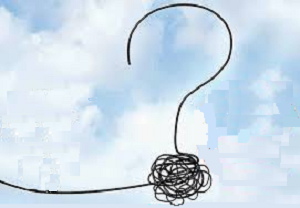 que poderiam estar falando de um futuro mais próximo do que imaginavam, imaginavam uma civilização em crise, não que um vírus poderia ser um catalizador que aprofundaria esta crise.
que poderiam estar falando de um futuro mais próximo do que imaginavam, imaginavam uma civilização em crise, não que um vírus poderia ser um catalizador que aprofundaria esta crise.
Logo de início mostra que um dos pontos importantes é entender que vivemos em uma ambivalência: “As crises agravam as incertezas, favorecem os questionamentos; podem estimular a busca de novas soluções e também provocar reações patológicas, como a escolha de um bode expiatório. São, portanto, profundamente ambivalentes.” (Morin, Viveret, p. 9).
Mas o que é a ambiguidade? “Ela se traduz pelo fato de que uma realidade, pessoa ou sociedade se apresenta sob o aspecto de duas verdades diferentes ou contrárias, ou então apresenta duas faces, não se sabendo qual é a verdadeira.” (idem), em outras palavras fake-news.
A análise da ambiguidade é bem mais complexa, mas pode ser sintetizada como: “É preciso ter sensibilidade para as contradições: quando chegamos, pelo estudo e pela análise, a duas verdades contraditórias, nosso hábito lógico consiste em mudar de raciocínio para eliminar a contradição. O que ocorre não apenas nos problemas políticos e sociais, mas também na física. É preciso assumir e transcender as contradições.” (pg. 12), e isto significa um ir-além de outros autores também.
Entender a ambiguidade exige um esforço de reconhecer a complexidade dos fenômenos, e na atual pandemia isto também se revelou, diz o livro de Morin e outros: “Ora, uma das tragédias do pensamento atual é que nossas universidades e escolas superiores produzem eminentes especialistas cujo pensamento é muito compartimentado. O economista enxerga apenas a dimensão econômica das coisas, assim como o religioso e o demógrafo nas suas respectivas áreas, e todos encontram dificuldade para entender as relações entre duas dimensões.” (pg. 13).
O livro penetrará em muitos âmbitos das ambivalências de uma crise, mas é preciso antes de uma condição prévio: “se não houver essas múltiplas sensibilidades para a ambiguidade, para a ambivalência (ou a contradição), para a complexidade, será muito pequena a capacidade de entender o sentido dos acontecimentos” (pg. 14).
Antes de entender como viver na crise é preciso uma condição prévia: “se não houver essas múltiplas sensibilidades para a ambiguidade, para a ambivalência (ou a contradição), para a complexidade, será muito pequena a capacidade de entender o sentido dos acontecimentos.” (pg. 14).
MORIN, E., VIVERET, P. Como sobreviver na crise ? . Tradução: Clóvis Marques. Rio de Janeiro: Bertrand do Brasil, 2013.
Eficácia da vacina e avanço da pandemia
Em notícia publicada em diversos jornais, destaque para a notícia no Washington Post,
a China admite a baixa eficácia da vacina Coronavac, porém a cidade de Serrana no Interior paulista vacinou mais de 50% da população, não foram vacinadas crianças e mulheres grávidas, num total de 21450 pessoas e o resultado foi de apenas uma morte para quem recebeu duas doses da vacina e cinco para voluntários que tinham recebido a primeira dose, o teste foi chamado de Projeto S e tem como objetivo justamente verificar a eficácia da vacina, em maio sairá um relatório.
Com os mesmos 90% de ocupação de leitos, o Estado de São Paulo voltará a fase vermelha, mas é preocupante, já em todo país com mais de 26,5 milhões de vacinados (gráfico), 14 estados estão em alta de infecção concentrados em parte do sudeste (SP, RJ, MG, PR), oeste (MT, MS, MT, GO), norte (PI, MA, CE, AM, AP) e no Nordeste PE.
O avanço da pandemia e a agressividade da nova cepa, junto com a lentidão da vacinação continua a provocar muitas mortes mesmo com o Brasil sendo o 5o. país do mundo com maior vacinação, só China, Estados Unidos, Reino Unido e e Índia vacinaram mais que o Brasil em números absolutos, porém considerando a vacinação para 100 habitantes, o Brasil cai para 56o. lugar no ranking, o número pode em diversos canais, incluindo a CNN.
Já globalmente o mundo caminha para a sexta semana em queda do contágio e a terceira semana em queda quanto a mortalidade, espera-se que a tendência se mantenha, os especialistas atribuem às medidas de combate e à sazonalidade, é um período ameno de temperatura, primavera/verão no hemisfério norte e outono no hemisfério sul, mas o inverno virá em dois meses, também preocupa que em alguns países a curva ainda não se reverteu.
A análise da OMS é que falar em “ondas” não faz muito sentido, afirma Daniel Lópes Acuña, ex diretor de emergências da OMS, afirmando que dependem mais das medidas tomadas e agora da eficácia da vacinação.
Este processo de políticas de contenção da doença, no Brasil desencadeou uma crise política, porém as medidas dos governadores estaduais também revelam contradições e pouca eficácia, exceto para o toque de recolher noturno, o lockdown é feito setorialmente, por exemplo, o estado de São Paulo volta as aulas presenciais dia 14 próximo.
Vaccination and dangers ahead
Official data from the On Data in World (in graphic) website 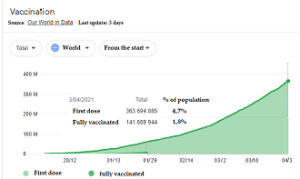 indicate a total vaccination in Brazil of 10.2 million people up to 3 days ago, while the world average is at the level of 6.5% and in countries like France, Italy and Germany they are inexplicable. rate close to 11% (even the WHO complained).
indicate a total vaccination in Brazil of 10.2 million people up to 3 days ago, while the world average is at the level of 6.5% and in countries like France, Italy and Germany they are inexplicable. rate close to 11% (even the WHO complained).
Only Israel close to 60% and the United Kingdom close to 50% have acceptable rates, in Latin America only Chile reached 30% and Uruguay to 20%, but it should be noted that Chile has a much smaller population of 18 million (less than the city of São Paulo), and Uruguay 3.5 million (slightly larger than Belo Horizonte if counting the cities Betim, Contagem that are neighboring), Brazil is close to 10% counting the first dose according to data from the same site (on Data in World ).
Two dangers strongly threaten the contamination rates: the new strain that spreads more quickly and the cold that should arrive soon, according to experts from Butantã in Sao Paulo, it is not possible to speed up the vaccine production process, but on the other hand, FioCruz in Rio de Janeiro promises to deliver 1 million daily doses, would arrive at the end of April with at least 40 million vaccinated with the first dose (this would be close to 20% of the population), and hope that the cold will delay, not counting the shipments that will come from the abroad and Butantã itself.
Fortunately the weather has been hot, despite cold fronts threatening in the south, the expectation for the next 15 days (until April 20, therefore), is to stay warm. although it is rainy, but there is no correct weather data, the forecasts are not always right.
It is hoped that a vaccination will be able to stop the successive increase of infections, we have broken several records of infection and deaths, and the aggressiveness of the new strain acts in these two aspects.
An innovative drug is announced on the market, and filed the order on Anvisa on March 30, it is a combination of monoclonal antibodies bamlanivimab and etesevimab that was developed by the pharmaceutical company Eli Lilly, and can help in mild cases and people who have respiratory problems , is the first drug really valid in prevention and in mild cases that have respiratory comorbidities, it can reach the market in 30 days.
This medicine has a powerful asset, since it has already been released by the Food and Drug Administration (FDA), the drug regulator in the USA, in short it is necessary to think of creative solutions and preventive measures cannot be ruled out, of course they are really valid.
Criticism of inadequate reason
Western philosophy lives in an inadequate reason, it cannot be rational to ignore the pain, death and inclement weather of nature and life, life is death and resurrection and without understanding one does not understand the other, in the middle of a pandemic it is observed that not even religious understood this.
rational to ignore the pain, death and inclement weather of nature and life, life is death and resurrection and without understanding one does not understand the other, in the middle of a pandemic it is observed that not even religious understood this.
In Western philosophy, idealism and its dualistic logic predominate, so pain and happiness complement each other, that is why so much sadism is possible with one’s own body, with human relationships, although now there is a great appeal to empathy, we have already discussed the “third party included ”Of quantum physics and the logic of going beyond me-you.
Epicurus submitted the pain to the tetrapharmakon, the idea that to deny it would be useless so it is to seek the best way to live with it, it is the neurotic terrain of right and wrong, of good and evil, to reach a philosophical plain populated as I would say Espinosa, good and bad encounters.
Epicurus’ first two remedies refer to the intellect, proper to idealism, to undo all the irrational superstitions and fears that cause anguish in men, the death and anger of the gods, that is why the litany God is good, he is , but incompatible with evil and this does not mean the absence of pain, but its transposition to a greater good.
The last two remedies are a hedonistic “ethics”, it deals with the preventive characters of pain and the obtaining of pleasure, they also do not admit pain with a contingency of life, and not everything is inevitable, for example death, and so it remains improper reason.
Camus also addressed the issue, and we had the opportunity to make a post about the Myth of Sisyphus, and his starting point is to find happiness where it is possible in dark times (wars).
If we admit the pain, and go through it, we will find a third go-beyond or think towards the beyond, suggested by Emmanuel Lévinas, which means to move more and more towards the stranger, the mystery and the infinite (another Lévinas theme) and we have already mentioned here the Cosmos and Teilhard de Chardin’s vision of a Christian worldview.
We entered Easter week and with it in the Christian worldview, the sacrifice of Christ replaces the sacrifice of the lamb made by Abraham (in the three great monotheistic religions: Islam, Judaism and Christianity), so the pain enters a new meaning from of which afterlife is possible.
It is serious, but there can be hope
While Europe is experiencing the 3rd. wave, the number of infected and the severity of the disease makes the pandemic a humanitarian crisis in Brazil, the hope is to increase the rate of vaccination.
and the severity of the disease makes the pandemic a humanitarian crisis in Brazil, the hope is to increase the rate of vaccination.
In Europe, the president of the European Commission, Ursula von der Leyen recognizes that the bloc of the 27 member countries “is not where it wanted” with immunization, and said that efforts should accelerate, despite the 2 billion doses contracted, for a population of 450 million, rates are still below 10%, which is very little due to the effort already made.
While Italy, Germany and France vaccination 10.3% outside the block the United Kingdom has already reached 36.5%, in Brazil close to 13% have already received the first dose, the official data is 15,503,373 for the first dose, while 4,699,784 for the second dose, in a total of more than 20 million, but the rate of infection and mortality grows, if we think that 12.5 million have already had covid-19 it can be said that in number there is a small advantage.
However, it is not so, it would be necessary that half of the population already had the first dose, but looking at the most optimistic case, which is the 38% of the United Kingdom, we see that the way to go is great.
The hope comes from the two institutes that develop the vaccine in Brazil, Butantã in São Paulo and FioCruz in Rio de Janeiro, it is believed that people over 60 years of age may be vaccinating in April, this would lead to a rate of just over 20% in the month, not counting the external contracts that can increase this number a lot, reaching an optimistic rate of 35%.
This is because the promise of 57,179,258 doses fell to 47,329,258 doses, among which the number decreased are Pfizer and Oxford, but with the promise of vaccines coming from abroad this rate could reach the goal expected in May for 47 657 058 just below the plan.
The rate will only exceed that planned in the month of August where more than 82 million doses are expected instead of the planned 35 million, so only in September can a drop in infections and deaths be expected, the health system is expected in trouble to get there.
The hope remains the growth of vaccines available on the market.
Love and divine logic
Only those who are able to overcome the limits of pain, hatred and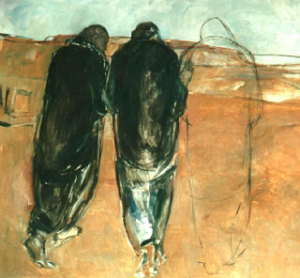 contempt can approach a divine love, it is necessary to overcome the dualistic logic of the struggle between good and evil, deo-logic is the one that always meets for good, what the Greeks called agathosyne, which comes from Agathon kindness in a high sense of spirit, and which is pursuit.
contempt can approach a divine love, it is necessary to overcome the dualistic logic of the struggle between good and evil, deo-logic is the one that always meets for good, what the Greeks called agathosyne, which comes from Agathon kindness in a high sense of spirit, and which is pursuit.
There is a third party included who walks with us.
Pain is often what hurts the soul the most, but it can also be the one that broadens it, in these moments of evolution of the pandemic crisis in the country, we face the most serious need to seek strength beyond sanitary measures, weak is true, but the The defense of life must continue in those who show solidarity with those affected by the virus.
Only by understanding this deeper sense of pain will we be able to embrace it, to have hope and to look to a future where we will no longer have to run after lost time, but prepare and anticipate ourselves to avoid even worse humanitarian crises, which may come.
There is always a third possibility and just as pain is a transition from one state to another, what can arise after much suffering is an even greater novelty, a leap in quality in what we are as men and as nature, and overcoming current stage.
Edgar Morin wrote in his recent book It is necessary to change the path: lessons from the coronavirus, in this sense as well: “The utopia of the best of all worlds must give way to the hope of a better world. Like every great crisis, like every great collective unhappiness, our planetary crisis awakens hope. ”
It can thus be better understood, both in the theological and philosophical sense, in a central passage of Jesus’ passion when on the cross he shouts (Mark 1,34): “. 34At three in the afternoon, Jesus cried out in a loud voice: – “Eloi, Eloi, lamá sabactâni?”, Which means: “My God, my God, why have you forsaken me?”, Because it is in this pain that the human and the divine become merge, emerging a new reality of death and resurrection, yes God died say the philosophers, but there is a third included: after he rose, so you can understand the passage from death to life.
All this pain, this “great collective unhappiness” says Morin awakens hope, because it is indeed a passage, perhaps the most painful that humanity has gone through, even though we have had hateful wars, even though we have conflicts of a social, ethnic and religious nature, there is a feeling of pain.
All this pain will only make sense if we find another way of looking at it right there in front.
Urgent vaccines and lockdown in Brazil
We have entered a critical phase of the pandemic in Brazil, even the most economically advanced state is already showing signs of hospital exhaustion and there is already a threat of an ongoing humanitarian crisis.

Flight arrives 17h30 International Airport in Guarulhos, Brazil.
A slight hope comes from the consortium Covax Facility, led by the WHO, landed in Guarulhos, Greater São Paulo, 1,022,400 doses of immunizers yesterday, and there is a prospect of more than 42 million doses this year, is the AstraZeneca/Oxford vaccine, manufactured by SK Bioscience of South Korea, the same one manufactured by Fiocruz with a definitive registration by Anvisa (the Brazilian Health Surveillance Association).
AstraZeneca´s 8 million that will come from the Serum Institute of India will be delayed (only 2 million arrive).
But the Coronavac from Butatan made available 24.6 million doses of the vaccine for the whole country, the schedule until the end of April foresees 46 million doses, where will the missing ones come from?
Anvisa has already granted the definitive registration for the Pfizer vaccine, which authorizes its importation, but the immunizer is not yet available on Brazilian soil, with the extension of the lockdown extension, Ceará State signed a contract for the direct purchase of the Russian Sputnik V vaccine, the state wants to acquire 5.8 million doses of this vaccine.
The União Química laboratory has production rights for Sputnik V in Brazil, but Anvisa charges the delivery of data for emergency use, the data published in the scientific journal The Lancet, indicate that the effectiveness of this vaccine is 91%.
The government has signed a contract to purchase 100 million doses of Pfizer immunizers, and the remaining 38 million from Janssen, which, however, does not yet have a definitive registry.
Several reports and scientific data show that a combination of lockdown with vaccination is necessary, the success of the United Kingdom and Portugal, where the number of hospitalizations has dropped dramatically, while the rest of Europe is facing a 3rd. wave.
Although it is difficult, it is necessary to have hope for vaccination and not to slow down measures of social isolation in Brazil.


 causou isto?, penso que não, há sempre uma esperança viva e uma dose até de otimismo que não devemos abandonar, por mais ingênua que ela pareça significa que caminhamos cuidadosos, mas com passos seguros.
causou isto?, penso que não, há sempre uma esperança viva e uma dose até de otimismo que não devemos abandonar, por mais ingênua que ela pareça significa que caminhamos cuidadosos, mas com passos seguros.